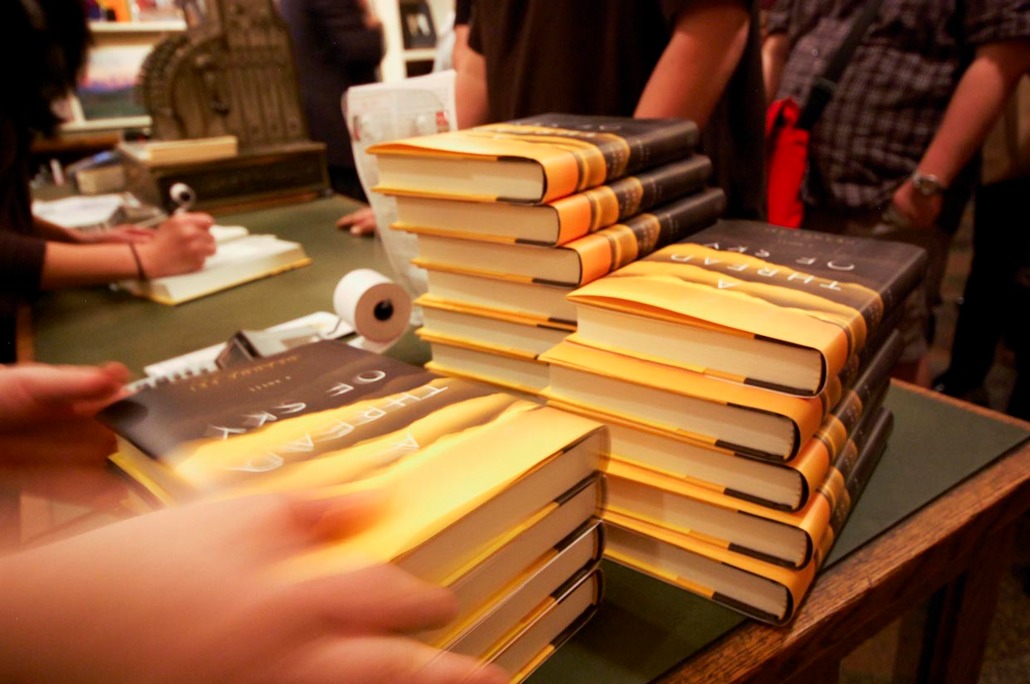
I’ve never enjoyed eves—Christmas, birthdays, New Year’s. I don’t do well with build-up; my version of excitement mostly consists of waiting to be bludgeoned by disappointment. So I either try to pretend the event isn’t happening, or I expect the worst while secretly praying to be slightly, pleasantly surprised. Even as a child, I preferred nightmares to wish-fulfillment dreams, because at least I’d wake up relieved.
Maybe this seems like a terrible attitude to have about a book launch. On some level, I feel fortunate, and grateful, and proud. But I’ll let Anne Lamott back me up: “The months before a book comes out of the chute are, for most writers, right up there with the worst life has to offer.” This could be partly because writers are a whiny lot, but it also seems to be an inevitable part of the process.
In Bird by Bird, Lamott writes about her students imagining that publication will bring them “financial security, peace of mind, and even joy,” and how she tries to explain that “It will not make them well. It will not give them the feeling that the world has finally validated their parking tickets, that they have in fact finally arrived. My writer friends, and they are legion, do not go around beaming with quiet feelings of contentment. Most of them go around with haunted, abused, surprised looks on their faces, like lab dogs on whom very personal deodorant sprays have been tested.”
Earlier today, I felt so thoroughly like one of those dogs that when the doorbell rang and I was told I had a delivery, I sighed into the intercom. I trudged down the stairs. I think I frowned at the deliveryman. I’m not proud of this, but I was thinking that one of my sweet, supportive family members or friends had sent flowers, and I would have to call them and feign excitement.
The delivery was a gorgeous fruit basket. (I’m a believer in the potency of fruit, along with tea, to nourish and cleanse; and perhaps tellingly, I have eaten very little fruit in the last weeks.) Attached to the basket was a note from my dear friend Frances. She had written, among other lovely words, a quote from John Currin—“There is no misery in art. All art is about saying yes, and all art is about its own making”—and an exhortation to keep saying yes. Reading this, I felt human again.
Then I thought of wise words I heard last week from two other writers, Sonya Chung and Nami Mun, who were unlucky enough to meet me in my lab-dog state.
I should mention that I don’t hang out much with other writers. My close writer friends number exactly two. My husband happens to be a journalist, and very early in our relationship—our first date, I think—I told him that if he ever decided to pursue fiction, we would not work out. I believe that writers tend to keep to themselves for a good reason, and that when we manage to talk to other people, those people should have fewer, or at least different, neuroses.
Also, writers can’t help getting jealous every now and then. As Lamott writes, in an entire chapter titled “Jealousy,” “some wonderful, dazzling successes are going to happen for some of the most awful, angry, undeserving writers you know—people who are, in other words, not you... Those writers will get the place on the best-seller list, the movie sales, the huge advances, and the nice big glossy pictures in the national magazines where the photo editors have airbrushed out the excessively long eyeteeth, the wrinkles, and the horns.”
So last week when I lurched, lab dog-style, to Nami and Sonya’s reading at the Asian American Writers’ Workshop, I wasn’t expecting them to offer me anything but their writing, which was as beautiful as I’d hoped. (Maybe I imagined, for a millisecond, that they’d have horns. Needless to say, they didn’t; if anything, they had the opposite.) When they learned I was bracing for my own book launch, they each gave me—until then, a stranger—the equivalent of a basket of fruit.
Sonya quoted one of my own favorite teachers, Marilynne Robinson, who recently said, “You are a ‘writer’ only when you are writing.” Which is not only very true, but also captures the weirdness of this moment, when we’re suddenly authors being asked to talk about writing, though all we really know to do is to write.
And Nami said something that made me give myself a good shake. She reminded me that the book is now out of my hands, that all I can do is ride this thing out. “But I don’t mean ride it,” she said. “I mean, RIDE it!”
Starting tonight, I intend to try.
